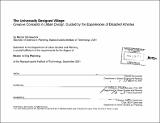The universally designed village : creative concepts in urban design, guided by the experiences of disabled athletes
Author(s)
Schmaedick, Marcel, 1975-
DownloadFull printable version (6.843Mb)
Other Contributors
Massachusetts Institute of Technology. Dept. of Urban Studies and Planning.
Advisor
J. Mark Schuster.
Terms of use
Metadata
Show full item recordAbstract
Universal design is the design of places and products so that they are usable by people of all ages and abilities, to the greatest extent possible, without the need for adaptations or specialized design. This thesis examines how urban designers can incorporate the values of universal design into the design of cities, and make their designs more accessible to people with disabilities. The experience of disabled people is so different from the experiences of able-bodied people, however, that able-bodied designers must involve disabled users in the design process if they wish to design successfully. This thesis takes the approach of discovering the urban design issues that are relevant to people with disabilities by interviewing athletes who have participated in the Paralympic Games. The Paralympic village is presumably one of the places in the world that is designed most directly with the need of disabled users in mind. Paralympic athletes are the intended users of the village and therefore are the most qualified to evaluate the success of Paralympic village design and the accessibility of urban spaces within the village. By learning firsthand, from the users of these spaces, the faults and successes in Paralympic village design, we can learn lessons that will help urban designers create more universally designed spaces. The choice of Paralympic athletes as the subjects of the interviews has other implications as well. Designs that are accessible to a Paralympic athlete may not be accessible to disabled people with lower levels of fitness or with more severe disabilities. But these athletes are representative of a growing movement within the disabled community to push the limits of their abilities and to enjoy life without pity, shame, or lowered expectations. They represent, hopefully, the best of what could be in terms of design for the disabled: a world where urban designers look farther than the lowest mandated standards of legislation like the ADA, to creating joyful, challenging and exciting environments for all people.
Description
Thesis (M.C.P.)--Massachusetts Institute of Technology, Dept. of Urban Studies and Planning, 2001. Includes bibliographical references (p. 143-150).
Date issued
2001Department
Massachusetts Institute of Technology. Department of Urban Studies and PlanningPublisher
Massachusetts Institute of Technology
Keywords
Urban Studies and Planning.